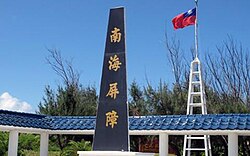Dongsha Atoll National Park
| Dongsha Atoll National Park | |
|---|---|
 | |
 | |
| Location | Pratas Island |
| Coordinates | 20°43′N 116°42′E / 20.717°N 116.700°E |
| Area | 3,537 km2 (1,366 sq mi) |
| Established | 17 January 2007 |
| Governing body | Marine National Park Headquarters, Ministry of the Interior |
| Website | www.marine.gov.tw |


The Dongsha Atoll National Park (Chinese: 東沙環礁國家公園; pinyin: Dōngshā Huánjiāo Guójiā Gōngyuán) is the seventh national park of the Republic of China (Taiwan).
The marine park is located at Pratas Island (Dongsha Island) in the north of the South China Sea, and includes the Dongsha Atoll (Pratas Atoll), a circular atoll 25 kilometres (16 mi) in diameter with a tropical monsoon climate, and the surrounding seas. The total area is 3,537 square kilometres (1,366 sq mi), with 1.79 square kilometres (0.69 sq mi) of land.[1]
The Park is managed by the Ministry of the Interior. It was established on 17 January 2007; and on 4 October of the same year an administrative office was set up in Kaohsiung City.
The park is not open to tourism due to environmental restoration, safety, and ecological studies currently in progress.[2]
Oceanology
[edit]| Month | Jan | Feb | Mar | Apr | May | Jun | Jul | Aug | Sep | Oct | Nov | Dec | Average |
|---|---|---|---|---|---|---|---|---|---|---|---|---|---|
| Temperature (°C) | 21.7 | 22.0 | 23.9 | 26.2 | 27.9 | 29.1 | 29.6 | 29.3 | 28.4 | 26.9 | 24.9 | 22.3 | 26.016 |
| Precipitation (mm) | 23.9 | 25.0 | 17.5 | 56.1 | 141.2 | 166.9 | 193.7 | 211.4 | 244.2 | 146.1 | 44.0 | 76.3 | 112.192 |
Ecology
[edit]Seagrass Beds are well formed in the atoll and in adjacent waters, providing rich bio-diversities of marine life from fish, jelly fish, squid, sicklefin lemon sharks,[3] and rays to rarer sea turtles, Dugongs, and cetaceans (dolphins and whales).[4][5] Recovery of green sea turtles has especially been noted.[6] Possible use of the atoll as a breeding ground by lemon sharks have been speculated due to the numbers of infants that have been discovered.[7] Dongsha Atoll is an important stepping-stone, that promotes regional genetic and potentially demographic connectivity in the South China Sea,[8] because larvae from Dongsha can reach many South China Sea reefs. Thus, its protection as a national park can potentially benefit the whole region.
In the past, illegal fishing has damaged the park. In 2004, a project to restore and conserve the ecology was approved, then to explore the possibility of environmental education and tourism.[2]
See also
[edit]References
[edit]- ^ 各國家公園基本資料表 (PDF) (in Chinese). Construction and Planning Agency, Ministry of the Interior, R.O.C.(Taiwan). June 6, 2014. Retrieved October 23, 2014.[permanent dead link]
- ^ a b "Is Dongsha Atoll National Park open for the tourists?". Marine National Park Headquarters. 29 October 2022. Retrieved 28 October 2022.
- ^ 黃旭磊. 2016. 〈南部〉尖齒檸檬幼鯊 悠游東沙環礁. The Liberty Times. Retrieved on March 28, 2017
- ^ Hsiao-yun S. (2013). "Featured Project - Removing the Veil of Mystery from the Seagrass Beds of Dongsha Island". The National Parks of Taiwan. Taiwan Government. Archived from the original (pdf) on 2015-01-03. Retrieved 2015-01-03.
- ^ Dai C. F. (2004). "Dong-sha Atoll in the South China Sea: Past, Present and Future". Reports at the ISLANDS of the WORLD VIII International Conference (2004):Changing Islands – Changing Worlds. Institute of Oceanography, National Taiwan University: 517–525. CiteSeerX 10.1.1.571.3480.
- ^ III. Achievements of Taiwan’s Marine Protected Areas Archived 2016-11-05 at the Wayback Machine, Fisheries Agency, Council of Agriculture, Government of Taiwan
- ^ Xinzhong P.. 2017. 東沙環礁 尖齒檸檬鯊幼兒樂園. The United Daily News. Retrieved on April 30, 2017
- ^ Liu, Shang Yin Vanson; Green, Jacob; Briggs, Dana; Hastings, Ruth; Jondelius, Ylva; Kensinger, Skylar; Leever, Hannah; Santos, Sophia; Throne, Trevor; Cheng, Chi; Madduppa, Hawis (2021-08-31). "Dongsha Atoll is an important stepping-stone that promotes regional genetic connectivity in the South China Sea". PeerJ. 9: e12063. doi:10.7717/peerj.12063. ISSN 2167-8359. PMC 8415289. PMID 34540369.
External links
[edit]- Dongsha Atoll National Park official site
- Dongsha Atoll Research Station(DARS) Archived 2017-10-11 at the Wayback Machine by the National Sun Yat-sen University
